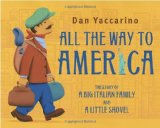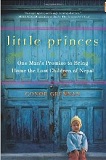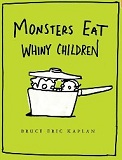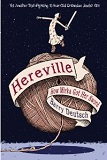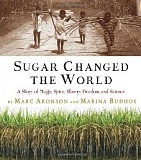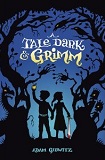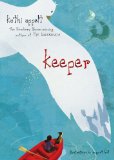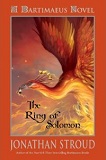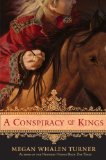 A Conspiracy of Kings
A Conspiracy of Kings
by Megan Whalen Turner
narrated by Jeff Woodman
Recorded Books, 2010. 7 CDs. 8.5 hours.
Starred Review
School Library Journal’s 2011 Battle of the Kids’ Books Undead Poll Winner
2010 Boston Globe-Horn Book Award Honor Book
Yes, I’ve already reviewed A Conspiracy of Kings, and named it my #1 2010 Sonderbooks Stand-out for Teen Fantasy Fiction.
But our library just got the audiobook version, so of course I had to “read” it again, on audio. In honor of School Library Journal’s 2011 Battle of the Kids’ Books, this is the perfect time to present a review of the audio version of A Conspiracy of Kings, another finalist.
The interesting thing in the Battle of the Kids’ Books, was that, despite being the best new book I read in 2010, A Conspiracy of Kings didn’t win a single round. Still, the judges admitted that this is a well-crafted book:
In the first round, judge Dana Reinhardt freely admitted that this isn’t her usual type of reading. She said:
“As I mentioned, A Conspiracy of Kings isn’t generally the kind of book I reach for, but Turner abruptly whisked me out of my comfort zone, (not an easy feat, as I’m quite comfortable in my comfort zone), and for this I’m truly grateful, because I did so enjoy spending time with Sophos. I found him companionable and clever. Decent and thoughtful. If times were different, and I lived in a fantastical monarchy, I’d surely want him as my king.
“A Conspiracy of Kings asks the big questions. The questions I want to grapple with as a reader. Questions about honor and duty and responsibility and friendship and loyalty.”
In the Big Kahuna Round, Richard Peck gave each book plenty of space. He said about A Conspiracy of Kings:
“Of the three A Conspiracy of Kings addresses the most adult concerns and makes the greatest demand upon the reader. It is about the altering alliances and dark diplomacy of power politics: palace pacts forged and broken. Betrayal. Betrothal.
“This chronicle of spilt blood, flying arrows and barons, and a stabbed horse makes resonant reading in the same season as “across the Middle Sea” the forces of Cyrenaica and Tripliana clash across actual geography. But this will ring no bells with the intended readers who don’t know where Libya is, and won’t be hearing about it at school.
“Megan Whalen Turner’s book is about the making of kings. Embedded in its many layers is a boy, Sophos/Sounis, coming of age parentless, abducted, enslaved, and that all-time favorite, misunderstood. Throughout, the ages of the characters are muffled. But there is the clash and passion of adolescent friendship, between Sophos and that major figure from earlier volumes: “He would have given Eugenides his heart on a toothpick if asked.””
Neither judge had read the earlier books, and neither judge felt that this one really stands alone.
But that brings me to a little pet peeve. So what if it doesn’t stand alone?
Many don’t realize that there is NOTHING in the criteria for the Newbery Award that says the book has to stand alone. Yes, it should only receive the award based on strengths in that particular book, but there’s nothing that says it can’t be part of a series or that all loose ends have to be tied up or that it can’t reference earlier books.
And of course, in this tournament, there was no criteria at all except the preference of the judges.
So, I’m concluding that it was simply unfortunate that the judges this book faced were ones who hadn’t happened to have read the earlier books.
No, the book doesn’t have to stand alone to win an award, but you can’t really expect a judge to read three additional books in order to give the one book they are judging the consideration it deserves. So by getting judges who hadn’t already read the earlier books, I didn’t really expect them to appreciate the true genius behind this book.
And, please, readers of my reviews, DO NOT read this book without reading the other three books first! All four books are exquisitely plotted. Why, oh why, would you want to risk ruining the surprises in the earlier books by reading them out of order? Start with The Thief and meet Eugenides and Sophos. Then move on to The Queen of Attolia, my favorite of all of them, with incredible plot twists and beautiful romance. Then read The King of Attolia, and finally you’ll be eager to read A Conspiracy of Kings.
Though A Conspiracy of Kings did not win a judged round, it was the clear, far-and-away winner of the Undead Poll. I found that interesting. So far, the Undead Poll seems to be about web presence. And Megan Whalen Turner’s books have a thriving fan site on livejournal. Now, I wasn’t absolutely sure that John Green’s book Will Grayson, Will Grayson, wouldn’t pull off the victory, since he has a huge online presence. However, John Green’s fan base is about his and his brother’s clever and amazing web videos. Whereas Megan Whalen Turner’s fan site is about her books. And since the books were what the poll was about, I wasn’t at all surprised that A Conspiracy of Kings won.
I’ve noticed that there are plenty of people for whom the books in this series are not “their type” of book. They don’t really like it, and aren’t interested in reading the series. But those for whom this is their type of book, well, we LOVE them all. The Sounis fan site shows that I am definitely not the only rabid fan.
And what type of book is it? Well, it’s generally classified as fantasy, but the only real touch of “magic” is a varying amount of involvement from the gods that the author has invented. It’s pseudo-historical, with a setting mirroring Greece just after the invention of gunpowder. I’ve filed the books under “Historical,” even knowing that’s not technically correct, just because they feel a bit more historical to me than fantasy books. Since the biggest issues are more about leading kingdoms than about using magic.
All I have to say is, try out The Thief. Read all the way to the surprising ending. If you like it at all, you are in for a treat, because you have three more books to read!
I should say that these books are my very favorite type of series book. I like each book in a series to have its own plot arc, and to have a definite ending of this episode. But I also like the books to build to a powerful whole. I just finished The Name of the Wind, by Patrick Rothfuss. It’s a lyrically written, magnificent work of fantasy. But it’s the first book of a trilogy, and I don’t think the author ties up one single solitary plot thread. Yes, it’s a good book, a truly great book. And yes, I will DEFINITELY be buying and reading the next two books. But I wish it weren’t just Part One of a continuing story. The same is true of Pegasus, by Robin McKinley. It’s only Part One. (This is probably a big part of why I haven’t heard it’s won any awards.)
And yes, there’s a place for long sagas like that. But I do have a fond and appreciative spot for series like The Queen’s Thief and The Bartimaeus Trilogy, where each book is a complete story that contributes to an even greater whole. You still should read them in order, and you’ll still want to hear more, but at least each book leaves you satisfied and happy, and with some plot threads resolved nicely.
And now I should say something about the audio version. Jeff Woodman has again done an outstanding job of reading this book. I like that he used the same voices for returning characters, so I could recognize the Magus, for example, by his voice.
One thing I love about listening to the book is that it slows me down. There’s no way I can spread out reading the book over more than a few nights, but listening, I am forced to take more time — and thus I can savor the book, and be delighted with what I am “reading” for quite a long time. Now, I did bring in the last CD to listen at home, when I couldn’t stand to wait any longer. But still, I spent much more time listening to the book than I spent either one of the two times I read it to myself.
And, like all of Megan Whalen Turner’s books, there’s so much to see and appreciate on later readings. You can more appreciate and delight in her plot-crafting. This time through, I especially noticed Sophos’ growth. He starts out the self-doubting kid we saw in The Thief, and we see him grow, realistically, through facing incredible challenges. We see and feel his real temptation to just settle down and enjoy life as a slave, without having to face the difficulties of trying to become a king. And then we see the consequences of his choice.
I love the way she plants clues to later surprises in full view of the reader. I think I can even mention one of them, without giving it away. She says that he doesn’t do a full bow, so the barons won’t notice a lump in his robe. Just beautiful to catch what that means on the rereading! And there are many of those little mentions, in each one of the books. Delightful to notice when reading it again! And it’s not just a gimmick or a trick — it actually reflects what Sophos was thinking about, how he was focusing on every detail…. I will say no more except to reiterate that I never get tired of rereading Megan Whalen Turner’s books.
So, I was sad that A Conspiracy of Kings didn’t win the 2011 Battle of the Kids’ Books, but I was proud that it won the popularity contest, the Undead Poll. And very glad that maybe these books will gain some more readers. But I hope they will listen to the judges saying that it doesn’t stand alone, and start with the very first book.
When I was following the links to the Sounis Livejournal site, I learned that Megan Whalen Turner is speaking, along with Jonathan Stroud, Rick Yancey, and Cindy Dobrez, at the Los Angeles Times Book Festival on the USC Campus. Although I can’t go myself, my youngest sister, Melanie Hatch, is a student at USC (in fact, she’ll be graduating soon and winning the Biegler Award for the graduating Electrical Engineering student with the highest GPA — Go, Melanie!), so I made sure she knew about it. Melanie was quick to point out that the event is actually happening on her birthday! So she’s looking forward to the best birthday ever! I’m so pleased for her! And I’m considering her my representative, so I can enjoy the event vicariously through her!
What’s more, it turns out that A Conspiracy of Kings is a finalist for the Los Angeles Book Prize for Young Adult Literature. It’s up against two other books that were in School Library Journal’s Battle of the Kids’ Books, including the winner of SLJBoB, The Ring of Solomon, by Jonathan Stroud, and the also excellent How Sugar Changed the World, by Marc Aronson and Marina Budhos. Two other finalists are Wicked Girls, by Stephanie Hemphill, and The Curse of the Wendigo, by Rick Yancey.
Will Ring of Solomon pull off the victory again? Will the judges appreciate Megan Whalen Turner’s true genius? We shall see, but however it turns out, these are some excellent finalists, and I’m really looking forward to my sister getting to hear these people speak — and telling me all about it!
Buy from Amazon.com
Find this review on Sonderbooks at: www.sonderbooks.com/Teens/conspiracy_of_kings_audio.html
Disclosure: I am an Amazon Affiliate, and will earn a small percentage if you order a book on Amazon after clicking through from my site.
Source: This review is based on a library book from the Fairfax County Public Library.
